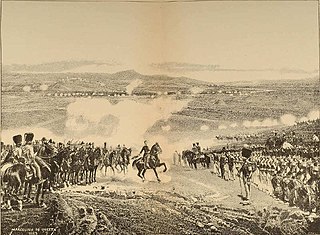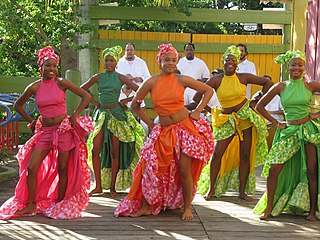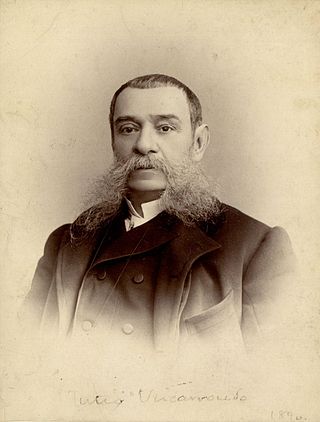Related Research Articles

Alfonso XII, also known as El Pacificador or the Peacemaker, was King of Spain from 29 December 1874 to his death in 1885. After the 1868 Glorious revolution that deposed his mother Isabella II from the throne, Alfonso studied in Austria and France. His mother abdicated in his favour in 1870, and he returned to Spain as king in 1874 following a military coup against the First Republic. Alfonso died aged 27 in 1885, and was succeeded by his son, Alfonso XIII, who was born the following year.

The history of the Caribbean reveals the significant role the region played in the colonial struggles of the European powers since the 15th century. In the modern era, it remains strategically and economically important. In 1492, Christopher Columbus landed in the Caribbean and claimed the region for Spain. The following year, the first Spanish settlements were established in the Caribbean. Although the Spanish conquests of the Aztec empire and the Inca empire in the early sixteenth century made Mexico and Peru more desirable places for Spanish exploration and settlement, the Caribbean remained strategically important.

Juan Prim y Prats, 1st Count of Reus, 1st Marquis of los Castillejos, 1st Viscount of Bruch was a Spanish general and statesman who was briefly Prime Minister of Spain until his assassination.

Segundo Ruiz Belvis was a Puerto Rican abolitionist who also fought for Puerto Rico's right to independence.

The emancipation of the British West Indies refers to the abolition of slavery in Britain's colonies in the West Indies during the 1830s. The British government passed the Slavery Abolition Act in 1833, which emancipated all slaves in the British West Indies. After emancipation, a system of apprenticeship was established, where emancipated slaves were required by the various colonial assemblies to continue working for their former masters for a period of four to six years in exchange for provisions. The system of apprenticeship was abolished by the various colonial assemblies in 1838, after pressure from the British public, completing the process of emancipation. These were the steps taken by British West Indian planters to solve the labour problems created by the emancipation of the enslaved Africans in 1838.

The First Carlist War was a civil war in Spain from 1833 to 1840, the first of three Carlist Wars. It was fought between two factions over the succession to the throne and the nature of the Spanish monarchy: the conservative and devolutionist supporters of the late king's brother, Carlos de Borbón, became known as Carlists (carlistas), while the progressive and centralist supporters of the regent, Maria Christina, acting for Isabella II of Spain, were called Liberals (liberales), cristinos or isabelinos. It is considered by some authors the largest and most deadly civil war of the period.

Slavery in the British and French Caribbean refers to slavery in the parts of the Caribbean dominated by France or the British Empire.

Slavery in the Spanish American colonies was an economic and social institution which existed throughout the Spanish Empire including Spain itself. In its American territories, early Spanish monarchs put forth laws against enslaving Indigenous peoples of the Americas. Queen Isabella outlawed the enslavement of Native Americans in the Spanish colonies of the New World because she viewed the natives as subjects of the Spanish monarchy. While Spain displayed an early abolitionist stance towards the Indigenous, some instances of illegal Native American slavery continued to be practiced by rogue individuals, particularly until the New Laws of 1543 which expressly prohibited it.

Brigadier General Luis Padial, was a soldier, politician and one of the most important figures who was responsible for the abolition of slavery in Puerto Rico.

The term British West Indies refers to the former English and British colonies and the present-day overseas territories of the United Kingdom in the Caribbean.

Afro-Puerto Ricans are Puerto Ricans who are of Black African descent. The history of Puerto Ricans of African descent begins with free African men, known as libertos, who accompanied the Spanish Conquistadors in the invasion of the island. The Spaniards enslaved the Taínos, many of whom died as a result of new infectious diseases and the Spaniards' oppressive colonization efforts. Spain's royal government needed laborers and began to rely on African slavery to staff their mining and fort-building operations. The Crown authorized importing enslaved West Africans. As a result, the majority of the African peoples who entered Puerto Rico were the result of the Atlantic slave trade, and came from many different cultures and peoples of the African continent.

The Spanish West Indies or the Spanish Antilles were Spanish colonies in the Caribbean. In terms of governance of the Spanish Empire, The Indies was the designation for all its overseas territories and was overseen by the Council of the Indies, founded in 1524 and based in Spain. When the Crown established the Viceroyalty of New Spain in 1535, the islands of the Caribbean came under its jurisdiction.

David Turnbull (1793–1851) was a leading 19th-century abolitionist and a British consul to Cuba. Turnbull, a Scotsman, was a key participant at the 1840 World Anti-Slavery Convention of the Anti-Slavery Society. Turnbull was blamed for creating a revolt in Cuba that resulted in 1844 being known as the Year of the Lash.

Isidro de Alaix Fábregas, Count of Vergara and Viscount of Villarrobledo, was a Spanish general of the First Carlist War, supporting the cause of the Liberals, who backed Isabella II of Spain and her regent mother Maria Christina. Born at Ceuta, Alaix fought during the Spanish War of Independence and also participated in the campaigns in South America against the independence movements there.

The Captaincy General of Puerto Rico was an administrative district of the Spanish Empire, created in 1580 to provide better military management of the island of Puerto Rico, previously under the direct rule of a lone governor and the jurisdiction of Audiencia of Santo Domingo. Its creation was part of the, ultimately futile, Habsburg attempt in the late 16th century to prevent incursion into the Caribbean by foreign powers. Spain also established Captaincies General in Cuba, Guatemala and Yucatán.

Julio Vizcarrondo Coronado was a Puerto Rican abolitionist, journalist, politician and religious leader. He played an instrumental role in the development and passage of the Moret Law which in 1873 abolished slavery in Puerto Rico. Vizcarrondo was also the founder of the Protestant movement in the Iberian Peninsula in the 19th century.

The Captaincy General of Cuba was an administrative district of the Spanish Empire created in 1607 as part of Habsburg Spain's attempt to better defend and administer its Caribbean possessions. The reform also established captaincies general in Puerto Rico, Guatemala and Yucatán.
Colonel Thomas Moody was a British geopolitical expert to the British Colonial Office; Commander of the Royal Engineers in the West Indies; Director of the British Royal Gunpowder Manufactory; Inspector of Gunpowder; and Director of the New Brunswick and Nova Scotia Land Company.

Major-General Sir Evan John Murray-Macgregor of Macgregor, 2nd Baronet, was a Scottish colonial administrator and senior British army officer.

Peter Baker (1731–1796) was an English slave trader. He formed the Liverpool slave trading company Baker and Dawson with his son-in-law John Dawson. In the period between 1783 and 1792, Baker and Dawson was the largest company of slave traders in England. They had an exclusive contract with the Spanish government to supply enslaved people to the Spanish colonies. In 1795, he became Mayor of Liverpool.
References
- ↑ Flinter, G.D. (1834). An Account of the Present State of the Island of Puerto Rico: Comprising Numerous Original Facts and Documents Illustrative of the State of Commerce and Agriculture, and of the Condition, Moral and Physical, of the Various Classes of the Population in that Island, as Compared with the Colonies of Other European Powers; Demonstrating the Superiority of the Spanish Slave Code,--the Great Advantages of Free Over Slave Labour. Slavery and anti-slavery: a transnational archive. Part 2: Slave trade in the Atlantic world. Longman, Rees, Orme, Brown, Green and Longman. p. vi.
![]() This article incorporates text from a publication now in the public domain : "Flinter, George Dawson". Dictionary of National Biography . London: Smith, Elder & Co. 1885–1900.
This article incorporates text from a publication now in the public domain : "Flinter, George Dawson". Dictionary of National Biography . London: Smith, Elder & Co. 1885–1900.